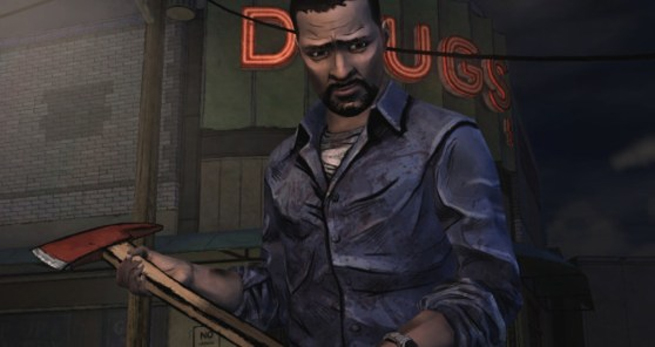
The Walking Dead (for the Xbox 360, PlayStation 3, PC, Mac, and iOS devices) is a classic point-and-click adventure game, its simple puzzles interspersed with light action sequences, quick-time events, and tension-filled decision-making. But it’s the story, not the gameplay, that makes it so compelling. At its core is the relationship between the hero, Lee Everett, and Clementine, an 8-year-old girl he befriends while seeking refuge from zombies in the Georgia suburbs. Over the course of five episodes, the game tells a grim tale of survival and morality, but none of it would have been nearly as effective if Telltale hadn’t done such a wonderful job in creating a cast of believable, relatable characters.
[aditude-amp id="flyingcarpet" targeting='{"env":"staging","page_type":"article","post_id":590975,"post_type":"story","post_chan":"none","tags":null,"ai":false,"category":"none","all_categories":"business,games,","session":"A"}']Children are often difficult to portray in video games or other types of entertainment media, but Telltale nails it. Clementine is both vulnerable and courageous. She’s innocent but not cloying. The game’s writers could’ve easily turned her into an annoying albatross, a character in need of protection and little else (see: the television show’s Season Two Carl). Instead, she’s a capable sidekick (see: Season Three Carl) and moral compass. Years from now, developers and critics alike will point to Clementine as an example of how to do a child character right.
AI Weekly
The must-read newsletter for AI and Big Data industry written by Khari Johnson, Kyle Wiggers, and Seth Colaner.
Included with VentureBeat Insider and VentureBeat VIP memberships.
The Walking Dead is by no means a perfect game. The puzzles are a little too simple at times, and the game suffers from some nasty bugs and framerate issues. But what it lacks in technical polish it more than makes up for in emotional, stress-inducing storytelling. For years, people have wondered why video game narratives don’t seem to have the same maturity and depth as films. While The Walking Dead has little in common with the latest Oscar contenders, it’s proof that we, as gamers, are ready for more than bombastic summer blockbusters. We’re ready for games that push the boundaries of storytelling — ones that move us and make us think. Many triple-A publishers have attempted it, but to see an indie studio accomplish it in a $25 downloadable episodic title is laudable. And that’s why The Walking Dead is GamesBeat’s 2012 Game of the Year.
Read our The Walking Dead reviews
Episode 2: Starved for Help review
Episode 3: Long Road Ahead review
Episode 4: Around Every Corner review
[aditude-amp id="medium1" targeting='{"env":"staging","page_type":"article","post_id":590975,"post_type":"story","post_chan":"none","tags":null,"ai":false,"category":"none","all_categories":"business,games,","session":"A"}']
GamesBeat’s 2012 Game of the Year Runners-Up
- XCOM: Enemy Unknown (Xbox 360, PC)
- Journey (PSN)
- Borderlands 2 (Xbox 360, PS3, PC)
- Far Cry 3 (Xbox 360, PS3, PC)
- Halo 4 (Xbox 360)
- Dishonored (Xbox 360, PS3, PC)
VentureBeat's mission is to be a digital town square for technical decision-makers to gain knowledge about transformative enterprise technology and transact. Learn More
